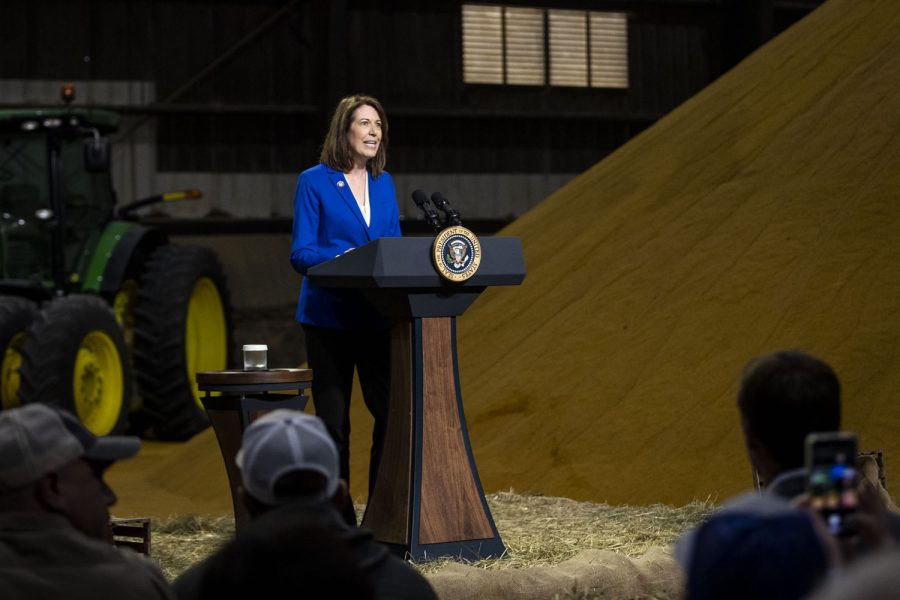House passes defense bill to end military vaccine mandate, Rep. Cindy Axne bill to reduce rural homelessness
In the 4,500-page-document, the U.S. House of Representatives passed a bipartisan bill to repeal the DOD’s vaccine mandate and pass Rep. Cindy Axne’s bill to reduce rural homelessness. The bill heads to the Senate, where it is expected to pass.
U.S. Rep. Cindy Axne, D-Iowa, speaks during President Joe Biden’s visit at the POET Bioprocessing ethanol plant in Menlo, Iowa, on Tuesday, April 12, 2022. Axne attended the visit with Biden.
December 8, 2022
The U.S. House of Representatives passed an $858 billion spending bill on Thursday to fund the Department of Defense for fiscal 2023 and ended the U.S. military COVID-19 vaccine mandate.
The appropriations bill, introduced by appropriations chair Adam Smith, D-Wash., included a repeal of the Department of Defense’s vaccine mandate, which suspended active duty members who were waiting for a religious exemption to the mandate.
The 4,500-page-document also included Rep. Cindy Axne’s, D-Iowa, bill that will give rural social services agencies more flexibility in the use of federal dollars to address rural homelessness.
The James M. Inhofe National Defense Authorization Act passed with overwhelming bipartisan support with a final vote of 350-80 in the House. Among the bill’s supporters were all four of Iowa’s Congressional delegates. The bill is expected to pass the U.S. Senate this week before heading to President Joe Biden’s desk.
Republican members of Congress have praised the repeal of the Department of Defense’s COVID-19 vaccine mandate, expressing concerns over its effects on service members who are working to obtain religious exemptions.
Under current policy, active military members must have received a COVID-19 vaccine or a religious exemption to avoid suspension. Iowa’s Republican U.S. Sen. Joni Ernst — a combat veteran and member of the Senate Armed Services Committee — voiced her concerns about the mandate and how it affects military readiness. Ernst is a co-sponsor of a bill in the Senate that would accomplish a similar goal.
“With record-low recruitment across all service branches, shrinking the number of servicemembers puts our national security at risk,” Ernst said in a news release on Wednesday expressing her support for the bill. “This commonsense effort protects our troops from being fired due to Biden’s COVID vaccine mandate at the cost of harm to service readiness or without fair appeal.”
Rep. Ashley Hinson, R-Iowa, also voiced her support for the repeal of the vaccine mandate in a news release on Thursday.
“I proudly supported the bipartisan NDAA — this legislation provides our troops with a pay raise, ensures we have the resources to take on China and Russia, and bolsters our national security,” Hinson said. “It also rescinds the Biden Administration’s COVID-19 vaccine mandate that hurt our military readiness and unfairly punished so many of our brave servicemembers.”
Axne wrote legislation included in the bill that gave rural social services agencies the flexibility to address rural homelessness in creative ways.
Axne said those addressing urban and rural homelessness face two different challenges that require flexibility. The bill does not add additional funding, but rather gives agencies flexibility not originally provided in the McKinney-Vento Homeless Assistance Act passed in 1987.
“It’s critical that we understand the solutions in rural areas are different also,” Axne said in a news release on Thursday. “My legislation will give more flexibility in how homelessness funding can be used by communities in rural Iowa to make sure everyone has a roof over their heads, and I look forward to seeing it signed into law this month.”















